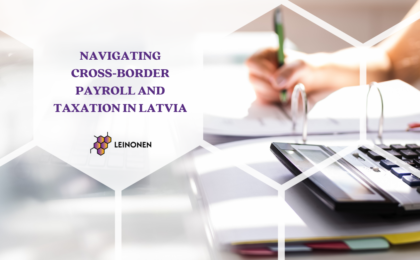Since 13 August 2008 there is in force “Money Laundering and Terrorism Financing Prevention Act” (the Act) whose objective is to prevent financing of terrorism and money laundering.
Like elsewhere in the world also in Latvia there has been introduced such a law in order to protect businesses from being involved in transactions with customers who are related to money laundering or financing of terrorism and, thus, unconsciously undermining reputation of their businesses.
According to the Act, money laundering is different manipulations of money, during which money obtained by criminal means gets apparent legal origin. Proceeds obtained by criminal means are property or financial resources, directly or indirectly, acquired by a person in ownership or possession, by committing a criminal offense or in other cases prescribed by the Criminal law.
The Act applies to companies operating in the banking and financial sector, in the lottery or gambling business or providing tax advice, accounting, audit, legal, real estate brokerage or money collection outsourcing services. The Act subjects are also persons engaged in trade of vehicles, precious metals or other types of goods, as well as intermediary or other type of service providers whom payment for goods or services provided is made in cash totaling 15 000 euros or more.
According to the Act subjects listed above, including professional service providers, have the following obligations:
1. considering type of business carried out to create internal control system in order to prevent money laundering and financing terrorism;
2. to identify the customer and carry out analysis about the customer before commencing a business relationship with;
3. to refuse to perform transaction and to report immediately to the supervisory and monitoring institution – to the Control Service[1], if the transaction or there is reasonable suspicion that:
a. there is identified that transaction has the money laundering or terrorism financing risk;
b. funds are directly or indirectly derived from a criminal offense or associates with terrorism financing;
In order to comply with the requirements of the Act, subjects of the Act is obliged to identify the client before commencing a business relationship. This obligation also applies to a “one off” relationship or transactions, if:
- amount of the transaction or several related transactions equivalent to 15 000 euros or more; or
- transaction meets at least one of criteria of unusual transaction (22.12.2008. the Cabinet of Ministers Rule No 1071 “On the list of indicators of unusual transactions and the procedures for reporting unusual or suspicious transactions”); or
- there is a suspicion of money laundering, financing of terrorism or attempt of those activities.
Client – a natural person’s identity shall be verified by personal identification document, but the legal person is identified by documents approving the establishment of the legal person or legal registration, as well as clarifying the legal address and the identity of the natural person representing the legal entity.
Next step after identification of client is to carry out research about the client, by determining the actual beneficiary and information about objectives and nature of intended business relationship. During ongoing business relationship with the customer, the suppliers of goods and services is required to update information about the customer’s business activities and make permanent supervision about transactions performed by the client to ensure that transactions are not considered unusual or suspicious.
The information obtained during the customer identification and investigation must be documented and this information should be stored at least 5 years after the termination of the business relationship.
One of the Act’s controlling authorities is the State Revenue Service. For violations of the Act entities may be penalized according to the Latvian Administrative Violations Code (the potential maximum fine is 700 euros).
[1] According to the Act the Control Service is a specially established state institution that operates under the supervision of the Prosecutor’s Office and in accordance with this Act takes control of unusual and suspicious transactions and collects, process and provides relevant information to the pre-trial investigation authorities. For more information about the Control Service, see the Ministry of Public Prosecutor’s Office website in Latvian http://www.prokuratura.gov.lv/public/29881.html



